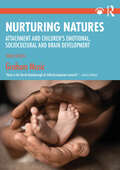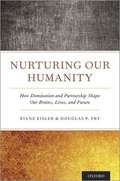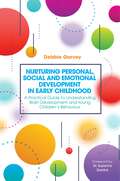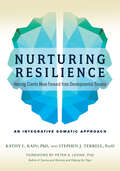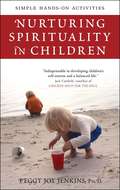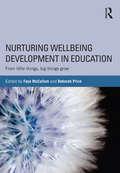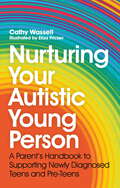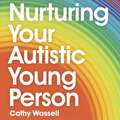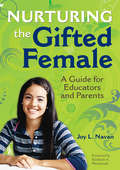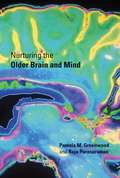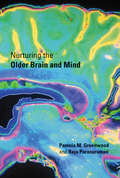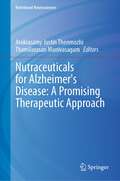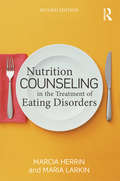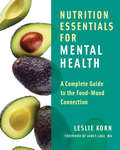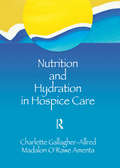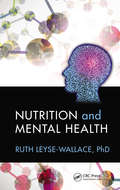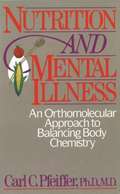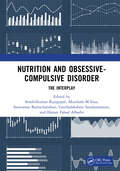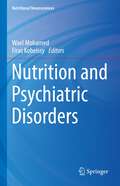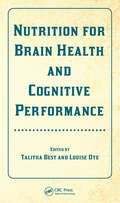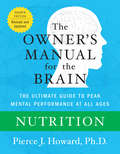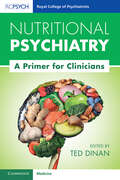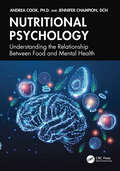- Table View
- List View
Nurturing Natures: Attachment and Children's Emotional, Sociocultural and Brain Development
by Graham MusicThis new edition of the bestselling text, Nurturing Natures, provides an indispensable synthesis of the latest scientific knowledge about children’s emotional development. Integrating a wealth of both up-to-date and classical research from areas such as attachment theory, neuroscience, developmental psychology and cross-cultural studies, it weaves these into an accessible, enjoyable text that always keeps in mind children recognisable to academics, practitioners and parents. New to this edition, the book considers transgender issues, same-sex parenting, experiences of black and minority ethnic groups, well-being and the impact of mental health in relation to climate change anxiety. It looks at key developmental stages from life in the womb to the preschool years and right up until adolescence, examining how children develop language, play and memory and moral capacities. Issues of nature and nurture are addressed and the effects of different kinds of early experiences are unpicked, creating a coherent and balanced view of the developing child in context. Nurturing Natures is written by an experienced child therapist who has used a wide array of research from different disciplines to create a highly readable and scientifically trustworthy text. Equipped with key points, questions for consideration, further reading and online video chapter introductions, this book is essential reading for childcare students, teachers, social workers, health visitors, early years practitioners and those training or working in child counselling, psychiatry and mental health. Full of fascinating findings, it provides answers to many of the questions people really want to ask about the human journey from conception into adulthood.
Nurturing Our Humanity: How Domination And Partnership Shape Our Brains, Lives, And Future
by Riane Eisler Douglas P. FryNurturing Our Humanity offers a new perspective on our personal and social options in today's world, showing how we can build societies that support our great human capacities for consciousness, caring, and creativity. It brings together findings--largely overlooked--from the natural and social sciences debunking the popular idea that we are hard-wired for selfishness, war, rape, and greed. Its groundbreaking new approach reveals connections between disturbing trends like climate change denial and regressions to strongman rule. <p><p> Moving past right vs. left, religious vs. secular, Eastern vs. Western, and other familiar categories that do not include our formative parent-child and gender relations, it looks at where societies fall on the partnership-domination scale. On one end is the domination system that ranks man over man, man over woman, race over race, and man over nature. On the other end is the more peaceful, egalitarian, gender-balanced, and sustainable partnership system. <p> Nurturing Our Humanity explores how behaviors, values, and socio-economic institutions develop differently in these two environments, documents how this impacts nothing less than how our brains develop, examines cultures from this new perspective (including societies that for millennia oriented toward partnership), and proposes actions supporting the contemporary movement in this more life-sustaining and enhancing direction. It shows how through today's ever more fearful, frenzied, and greed-driven technologies of destruction and exploitation, the domination system may lead us to an evolutionary dead end. A more equitable and sustainable way of life is biologically possible and culturally attainable: we can change our course.
Nurturing Personal, Social and Emotional Development in Early Childhood: A Practical Guide to Understanding Brain Development and Young Children’s Behaviour
by Debbie Garvey Dr Suzanne ZeedykThis direct guide supports practitioners in nurturing personal, social and emotional development (PSED) in young children by demystifying brain development research. Condensing a wealth of recent research and theory around PSED into practical guidance, it gives professionals the knowledge and understanding they need to critically evaluate their own practice and find the best course of action to support PSED in young children. From the perspective of neuroscience, it explores what can help or hinder development, considers why some children bite and why toddlers have tantrums, and questions how well-intentioned actions, such as reward systems or putting new foods on a plate for children to 'just try', may be misguided.
Nurturing Resilience: Helping Clients Move Forward from Developmental Trauma--An Integrative Somatic Approach
by Peter A. Levine Kathy L. Kain Stephen J. TerrellA practical, integrated approach for therapists working with people (both adults and children) who have been impacted by developmental trauma and attachment difficultiesKathy L. Kain and Stephen J. Terrell draw on fifty years of their combined clinical and teaching experience to provide this clear road map for understanding the complexities of early trauma and its related symptoms. Experts in the physiology of trauma, the authors present an introduction to their innovative somatic approach that has evolved to help thousands improve their lives. Synthesizing across disciplines--Attachment, Polyvagal, Neuroscience, Child Development Theory, Trauma, and Somatics--this book provides a new lens through which to understand safety and regulation. It includes the survey used in the groundbreaking ACE Study, which discovered a clear connection between early childhood trauma and chronic health problems. For therapists working with both adults and children and anyone dealing with symptoms that typically arise from early childhood trauma--anxiety, behavioral issues, depression, metabolic disorders, migraine, sleep problems, and more--this book offers fresh hope.
Nurturing Spirituality in Children
by Peggy Joy JenkinsThe greatest gifts that a child can receive are an opened mind, a caring heart, and ignited creativity. This fully expanded, illustrated edition of Nurturing Spirituality in Children includes sixty-two simple and thought-provoking lessons that can be shared with children in less than ten minutes each. The lessons are easy to prepare and understand; they use commonly available materials and complement a wide variety of religious perspectives. Children who develop a healthy balance of mind and spirit are better able to respond to life's challenges when given the tools to think and discover for themselves. Dr. Jenkins gives scores of age-appropriate activities that help children learn empathy, trust, forgiveness, growth, and inner peace.
Nurturing Wellbeing Development in Education: From little things, big things grow
by Deborah Price Faye McCallumAt the core of education, the notion of wellbeing permeates both learner and teacher wellbeing. This book explores the central role and responsibility of education in ensuring the wellbeing of children and young people. Through the employment of vignettes, proactive educational wellbeing initiatives are provided to address issues pertaining to learner and teacher wellbeing, mainstream classrooms, educational marginalisation, disabilities, cyber citizens, initial teacher education and rural education. Through employing diverging theoretical approaches of; expectancy x value theory; ecological systems theory and community practices across digital imagery; case studies; questionnaires and survey methodology, the key message of the centrality of wellbeing to educational success pervades. This book provides a critical engagement with the educational discourse of wellbeing, whilst addressing issues impacting on wellbeing with worldwide implications. It offers a unique insight into both learner and teacher wellbeing and how education can contribute to enhancing wellbeing outcomes for society in general.
Nurturing Your Autistic Young Person: A Parent’s Handbook to Supporting Newly Diagnosed Teens and Pre-Teens
by Cathy WassellAs the parent of a child recognised as autistic as a pre-teen or teen, it can often feel difficult to find the answers you need. Children who make it to late primary/early secondary age before being picked up by the system tend to present with traits that are harder to spot, meaning it can be harder to engage professionals in the diagnostic process and gather the necessary support.Cathy Wassell, CEO of Autistic Girls Network, has tailored this handbook to support parents with older children or teenagers who are at the identification stage, walking them through the basics in an engaging and accessible manner. She addresses key challenges for this age group, including co-occurring conditions, puberty, and safeguarding, as well as looking to the future, advising on schooling options, and beyond.Designed to help parents become fully informed and ensure a nurturing and positive environment for our autistic young people, this is a guide with a focus on difference - not deficit.
Nurturing Your Autistic Young Person: A Parent’s Handbook to Supporting Newly Diagnosed Teens and Pre-Teens
by Cathy WassellAs the parent of a child recognised as autistic as a pre-teen or teen, it can often feel difficult to find the answers you need. Children who make it to late primary/early secondary age before being picked up by the system tend to present with traits that are harder to spot, meaning it can be harder to engage professionals in the diagnostic process and gather the necessary support.Cathy Wassell, CEO of Autistic Girls Network, has tailored this handbook to support parents with older children or teenagers who are at the identification stage, walking them through the basics in an engaging and accessible manner. She addresses key challenges for this age group, including co-occurring conditions, puberty, and safeguarding, as well as looking to the future, advising on schooling options, and beyond.Designed to help parents become fully informed and ensure a nurturing and positive environment for our autistic young people, this is a guide with a focus on difference - not deficit.
Nurturing the Gifted Female: A Guide for Educators and Parents
by Joy NavanStrengthen gifted girls' potential by exploring characteristics of girls' giftedness; factors affecting development; issues of resilience, self-efficacy, and personal ethics; and the importance of supportive adults.
Nurturing the Older Brain and Mind
by Pamela M. Greenwood Raja ParasuramanAlthough our physical abilities clearly decline as we age, cognitive decline in healthy old age is neither universal nor inevitable. In Nurturing the Older Brain, Pamela Greenwood and Raja Parasuraman show that scientific research does not support the popular notion of the inexorable and progressive effects of cognitive aging in all older adults. They report that many adults maintain a high level of cognitive function into old age and that certain experiential and lifestyle factors--including education, exercise, diet, and opportunities for new learning--contribute to the preservation of cognitive abilities. Many popular accounts draw similar conclusions and give similar lifestyle advice but lack supporting scientific evidence. Greenwood and Parasuraman offer a comprehensive review of research on cognitive and brain aging. They show that even the aged brain remains capable of plasticity--the ability to adapt to and benefit from experience--and they summarize evidence that brain plasticity is heightened by certain types of cognitive training, by aerobic exercise, and by certain diets. They also report on the somewhat controversial use of estrogen and cognition-enhancing drugs, on environmental adaptations (including "virtual assistants") that help older adults "age in place," and on genetic factors in cognitive aging. The past twenty years of research points to ways that older adults can lead rich and cognitively vital lives. As millions of baby boomers head toward old age, Greenwood and Parasuraman's accessible book could not be more timely.
Nurturing the Older Brain and Mind
by Pamela M. Greenwood Raja ParasuramanTwo noted researchers explain scientific evidence that shows why certain experiential and lifestyle factors may promote and maintain cognitive vitality in older adults.Although our physical abilities clearly decline as we age, cognitive decline in healthy old age is neither universal nor inevitable. In Nurturing the Older Brain, Pamela Greenwood and Raja Parasuraman show that scientific research does not support the popular notion of the inexorable and progressive effects of cognitive aging in all older adults. They report that many adults maintain a high level of cognitive function into old age and that certain experiential and lifestyle factors—including education, exercise, diet, and opportunities for new learning—contribute to the preservation of cognitive abilities.Many popular accounts draw similar conclusions and give similar lifestyle advice but lack supporting scientific evidence. Greenwood and Parasuraman offer a comprehensive review of research on cognitive and brain aging. They show that even the aged brain remains capable of plasticity—the ability to adapt to and benefit from experience—and they summarize evidence that brain plasticity is heightened by certain types of cognitive training, by aerobic exercise, and by certain diets. They also report on the somewhat controversial use of estrogen and cognition-enhancing drugs, on environmental adaptations (including "virtual assistants") that help older adults "age in place," and on genetic factors in cognitive aging.The past twenty years of research points to ways that older adults can lead rich and cognitively vital lives. As millions of baby boomers head toward old age, Greenwood and Parasuraman's accessible book could not be more timely.
Nutraceuticals for Alzheimer's Disease: A Promising Therapeutic Approach (Nutritional Neurosciences)
by Arokiasamy Justin Thenmozhi Thamilarasan ManivasagamThis book reviews the potential effect of diet modification, lipids, and carbohydrate consumptions, vitamin supplementation, antioxidants, and nutraceuticals in the prevention and management of Alzheimer's disease. The initial chapter of the book presents the pathophysiological mechanisms, risk factors, genetic predisposition, disease diagnosis, pathology, and current treatment strategies against Alzheimer's disease. It also highlights recent developments in exploring novel compounds for the prevention and treatment of Alzheimer's disease. Subsequently, it highlights the therapeutic effect and regulation of molecular targets by natural compounds. The book discusses the potential of natural compounds in inhibiting the formation and deposition of Aβ peptides. It examines the natural compounds in modulating intracellular signaling molecules and enzymes involved in the pathogenesis of Alzheimer's disease. In summary, this book helps understand the role of natural compounds as a therapeutic approach in amelioration and preventing detrimental effects of Alzheimer's disease.
Nutrition Counseling And Education Skills: A Guide For Professionals
by Judith Beto Betsy HolliNow in vibrant full color, this updated Seventh Edition of Holli’s best-selling Nutrition Counseling and Education Skills: A Guide for Professionals helps students develop the communications, counseling, interviewing, motivational, and professional skills they’ll need as Registered Dietitian professionals. Throughout the book, the authors focus on effective nutrition interventions, evidence-based theories and models, clinical nutrition principles, and knowledge of behavioral science and educational approaches. Packed with activities, case studies, and self-assessment questions, the Seventh Edition features new content that reflects the latest changes in the field, new online videos that bring nutrition counseling techniques to life, and a powerful array of new and enhanced in-text and online learning tools.
Nutrition Counseling in the Treatment of Eating Disorders
by Marcia Herrin Maria LarkinMarcia Herrin and Maria Larkin have collaborated on the second edition of Nutrition Counseling in the Treatment of Eating Disorders, infusing research-based approaches and their own clinically-refined tools for managing food and weight-related issues. New to this edition is a section on nutrition counseling interventions derived from cognitive behavioral therapy-enhanced, dialectical behavioral therapy, family-based treatment, and motivational interviewing techniques. Readers will appreciate the state of the art nutrition and weight assessment guidelines, the practical clinical techniques for managing bingeing, purging, excessive exercise, and weight restoration as well as the unique food planning approach developed by the authors. As a comprehensive overview of food and weight-related treatments, this book is an indispensible resource for nutrition counselors, psychotherapists, psychiatrists, physicians, and primary care providers.
Nutrition Essentials for Mental Health: A Complete Guide to the Food-Mood Connection
by James Lake Leslie KornExploring the connection between nutrition and mental wellness so therapists can provide more effective, integrated treatment. Diet is an essential component of a client’s clinical profile. Few therapists, however, have any nutritional training, and many don’t know where to begin. In Nutrition Essentials for Mental Health, Leslie Korn provides clinicians with a practical guide to the complex relationship between what we eat and the way we think, feel, and interact with the world. Where there is mental illness there is frequently a history of digestive and nutritional problems. Digestive problems in turn exacerbate mental distress, all of which can be improved by nutritional changes. It’s not unusual for a deficit or excess of certain nutrients to disguise itself as a mood disorder. Indeed, nutritional deficiencies factor into most mental illness—from anxiety and depression to schizophrenia and PTSD—and dietary changes can work alongside or even replace medications to alleviate symptoms and support mental wellness. Nutrition Essentials for Mental Health offers the mental health clinician the principles and practices necessary to provide clients with nutritional counseling to improve mood and mental health. Integrating clinical evidence with the author’s extensive clinical experience, it takes clinicians step-by-step through the essentials for integrating nutritional therapies into mental health treatment. Throughout, brief clinical vignettes illustrate commonly encountered obstacles and how to overcome them. Readers will learn: • Why nutrition matters in mental health • The role of various nutrients in nourishing both the brain and the gut, the “second brain” • Typical nutritional culprits that underlie or exacerbate specific mental disorders • Assessment techniques for evaluating a client’s unique nutritional needs, and counseling methods for the challenging but rewarding process of nutritional change. • Leading-edge protocols for the use of various macro- and micronutrients, vitamins, and supplements to improve mental health • Considerations for food allergies, sensitivities, and other special diets • The effects of foods and nutrients on DSM-5 categories of illness, and alternatives to pharmaceuticals for treatment • Comprehensive, stage-based approaches to coaching clients about dietary plans, nutritional supplements, and other resources • Ideas for practical, affordable, and individualized diets, along with optimal cooking methods and recipes • Nutritional strategies to help with withdrawal from drugs, alcohol and pharmaceuticals And much more. With this resource in hand, clinicians can enhance the efficacy of all their methods and be prepared to support clients’ mental health with more effective, integrated treatment.
Nutrition and Hydration in Hospice Care: Needs, Strategies, Ethics (The\hospice Journal #Vol. 9, Nos. 2/3)
by Charlette Gallagher-Allred Madalon O'Rawe AmentaThis scholarly book enables health care professionals to appropriately address hospice patients’and families’concerns about nutrition and hydration. Nutrition and Hydration in Hospice Care is a comprehensive resource that provides hands-on practical information that readers can use in everyday hospice practice. The chapters identify problems, solutions, and ethical issues of nutrition and hydration in hospice care.The contributing authors provide the way for health care professionals, especially those in nursing, dietary, and pharmacy units, to jointly and effectively manage troublesome symptoms and ethical issues. The following topics are included in the scope of coverage: nutrition/hydration needs during end-stage disease nursing and dietary roles in identifying nutrition/hydration problems and implementing treatment how needs of dying children and adults are different legal and ethical dilemmas of withholding or withdrawing nutrition and hydration appropriate and inappropriate uses of enteral and parenteral nutrition support during end-stage diseases food service considerations in inpatient hospice facilities appetite stimulant use in palliative careBecause Nutrition and Hydration in Hospice Care is comprehensive, all members of hospice staffs can find practical information to use each day. The authors cover issues not found in other books for nurses, dietitians, pharmacists, and physicians. They will find the information ready to apply at their work settings.
Nutrition and Mental Health
by Ruth Leyse-WallaceAn examination of the role nutrients play in mental health, this book reviews the scientific literature from many fields of science: health, psychology, nutrition, mental well-being, and the interface with chronic disease. The book provides a straightforward, readable report of broadly selected scientific research on how various nutrients affect mental health. It covers several types of mental health disorders and their links to nutrients, nutritional status, and nutritional supplements. This book provides mental health professionals with the information they need to evaluate nutritional issues.
Nutrition and Mental Illness: An Orthomollecular Approach to Balancing Body Chemistry
by Carl C. PfeifferNutritional therapy for mental illness. Explains the role played by vitamins and trace elements in mental health.
Nutrition and Obsessive-Compulsive Disorder: The Interplay
by Senthilkumar Rajagopal Saravanan Ramachandran Geethalakshmi Sundararaman Hanan Fahad Alharbi Musthafa M EssaKey features – Covers emerging therapeutic and nutritional approaches for the treatment and management of OCD Reviews the role of various micro-nutrients in OCD Discusses the prenatal genetic diagnosis and application of computational modelling in OCD Includes the nutritional and dietary roles in neuropsychiatric disorders like depression and obsessive-compulsive disorder (OCD) Explores the application of nano-biotechnology in OCD
Nutrition and Psychiatric Disorders (Nutritional Neurosciences)
by Firas Kobeissy Wael MohamedThe book comprehensively reviews the role of nutrition in psychiatric disorders. It provides mechanistic insights into the effects of nutrition on metabolic pathways, mitochondrial nutrients, neurodegeneration and CNS disorders, cell signaling, and neuronal functions. The book further highlights the role of diet in preventing and treating mental health and modifying drug treatment effects. Further, it explores the relationship between nutrition and psychiatric disorders, including depression, autism, anxiety, Attention-Deficit / Hyperactivity Disorder, and OCD. The book further explores the recent advancements in understanding the important role of nutrients as therapeutics in various psychiatric disorders. Lastly, it presents an overview of nutrients as neuroprotective agents along with the main principles of nutrigenomics. The book is essential reading for neuroscientists interested interest in food therapeutic strategies.
Nutrition for Brain Health and Cognitive Performance
by Talitha Best Louise DyePublic awareness of the role diet plays in brain function has been steadily increasing. This has led to significant development of new products, dietary supplements, functional foods, nutraceuticals and public health recommendations for maintaining brain function. Nutrition for Brain Health and Cognitive Performance presents a detailed and innovati
Nutrition: The Owner's Manual
by Pierce HowardCutting-edge, user-friendly, and comprehensive: the revolutionary guide to the brain, now fully revised and updatedAt birth each of us is given the most powerful and complex tool of all time: the human brain. And yet, as we well know, it doesn't come with an owner's manual--until now. In this unsurpassed resource, Dr. Pierce J. Howard and his team distill the very latest research and clearly explain the practical, real-world applications to our daily lives. Drawing from the frontiers of psychology, neurobiology, and cognitive science, yet organized and written for maximum usability, The Owner's Manual for the Brain, Fourth Edition, is your comprehensive guide to optimum mental performance and well-being. It should be on every thinking person's bookshelf. What are the ingredients of happiness? Which are the best remedies for headaches and migraines? How can we master creativity, focus, decision making, and willpower? What are the best brain foods? How is it possible to boost memory and intelligence? What is the secret to getting a good night's sleep? How can you positively manage depression, anxiety, addiction, and other disorders? What is the impact of nutrition, stress, and exercise on the brain? Is personality hard-wired or fluid? What are the best strategies when recovering from trauma and loss? How do moods and emotions interact? What is the ideal learning environment for children? How do love, humor, music, friendship, and nature contribute to well-being? Are there ways of reducing negative traits such as aggression, short-temperedness, or irritability? What is the recommended treatment for concussions? Can you delay or prevent Alzheimer's and dementia? What are the most important ingredients to a successful marriage and family? What do the world's most effective managers know about leadership, motivation, and persuasion? Plus 1,000s more topics!
Nutritional Psychiatry: A Primer for Clinicians
by Ted DinanThere is increasing evidence that mental health problems such as schizophrenia, depression and anxiety are linked with poor nutrition. At present, very few psychiatrists provide nutritional advice for their patients, despite such advice complimenting drug and psychological therapies. This edited volume is the first book to provide a comprehensive overview of the relationship between nutrition and mental health, for mental health professionals. Featuring contributions from leading authorities in the field, the book examines the link between diet and the microbiome-gut brain axis and how this correlates with a variety of psychiatric disorders. The book explores how enhancing the beneficial bacteria in the gut, through the use of psychobiotics, prebiotics or dietary change can improve mood and reduce anxiety. The book will appeal to psychiatrists and psychologists, behavioural scientists, neuroscientists and nutritionists.
Nutritional Psychology: Understanding the Relationship Between Food and Mental Health
by Andrea Cook Jennifer ChampionNutritional Psychology: Understanding the Relationship Between Food and Mental Health provides a broad look at the intersection between food and mental health and offers a comprehensive approach to effectively prioritize nutrition as a powerful component to maintaining overall wellbeing. Each of the 16 chapters deeply informs about a broad range of nutritional factors including those that promote stable blood sugar levels, optimize brain functioning, and contribute to the microbiome and hormone levels so important to the brain-gut connection. There are useful insights into the dynamics of food selection, eating disorders, obesity, body image, and nutrition quality that can stabilize or destabilize mental and emotional disorders. Additionally, environmental influences that shape eating behaviors are fully explored.Nutritional Psychology: Understanding the Relationship Between Food and Mental Health combines psychology, nutrition, and medicine to form a framework for optimizing the relationship between diet and mental wellbeing. This textbook is designed for undergraduate and graduate psychology and nutrition college courses for students pursuing careers as psychologists, dietitians, nurses, social workers, and a variety of health professionals who want to incorporate nutrition and eating behavior into their discussions with patients.Dr. Cook and Dr. Champion are both clinicians who work directly with clients with psychological and physical health issues and utilize a blend of nutritional and psychological interventions in their work, providing useful clinical applications for nutritional psychology.
Nutritional Strategies for the Very Low Birthweight Infant
by David H. AdamkinThe goal of nutritional management in VLBW and ELBW infants is the achievement of postnatal growth at a rate that approximates the intrauterine growth of a normal fetus at the same postconceptional age. In reality, however, growth lags considerably after birth; although non-nutritional factors are involved, nutrient deficiencies are critical in explaining delayed growth. This practical clinically-oriented pocketbook reviews and summarises all available clinical evidence. It enables the reader to implement parenteral or enteral feeding plans, with the goals of reducing postnatal weight loss, earlier return to birthweight, and improved catch-up growth. Both nutrient balance and growth and the impact on neurodevelopment and health outcomes are evaluated. With many tables and algorithms to summarise key data and management strategies, Nutritional Strategies for the Very Low Birthweight Infant is an invaluable guide for all healthcare professionals caring for premature babies.
